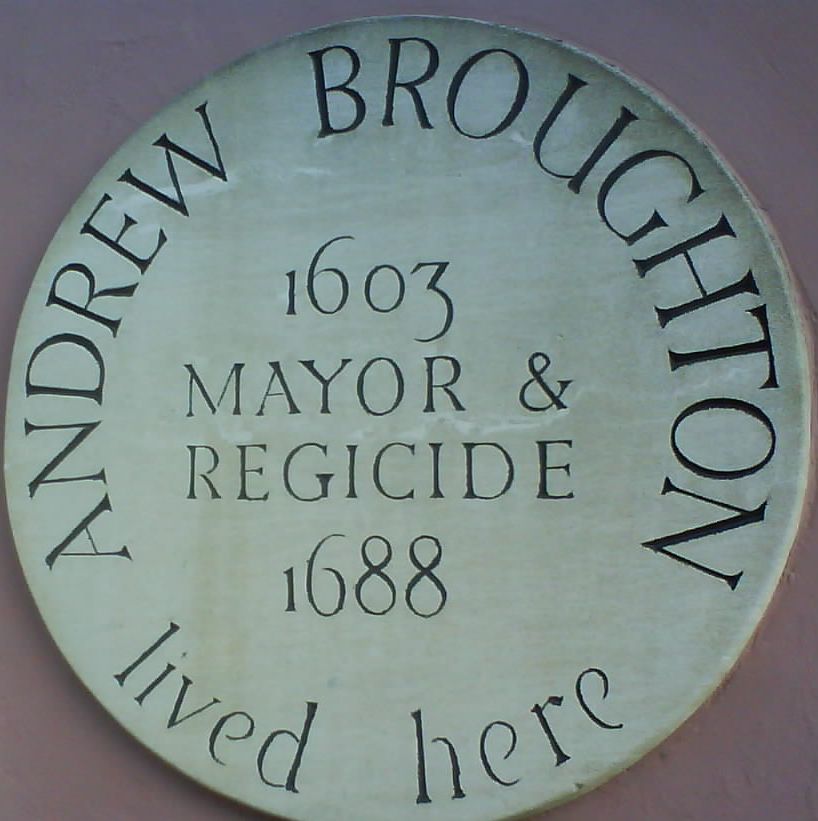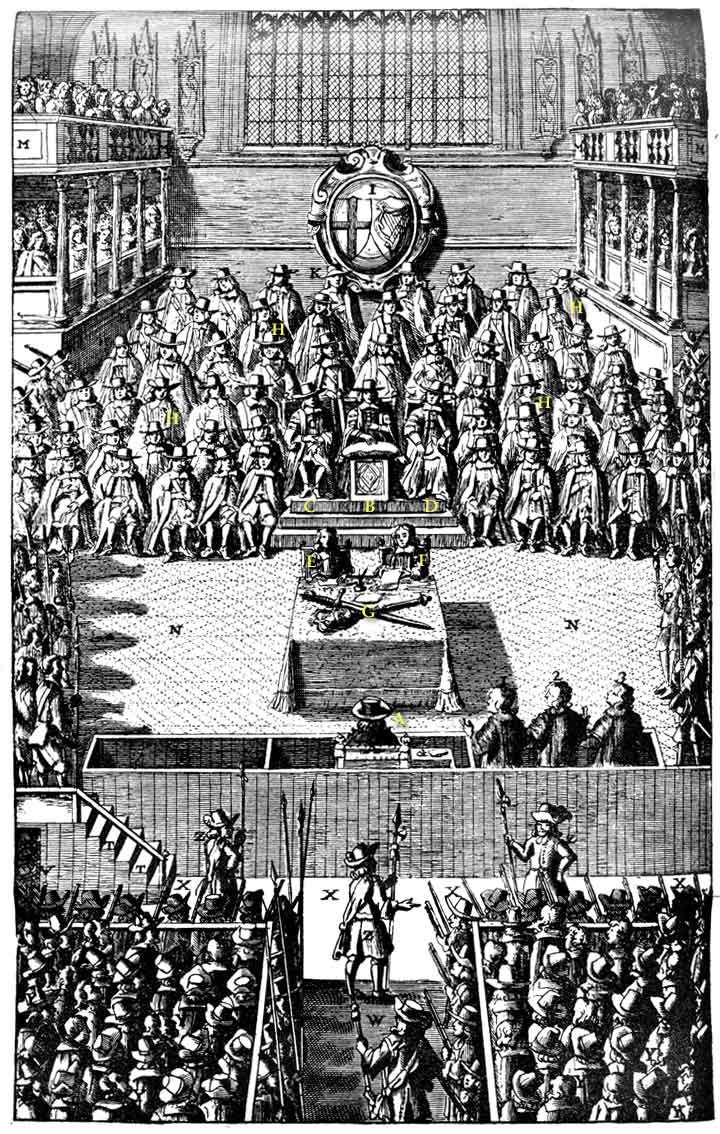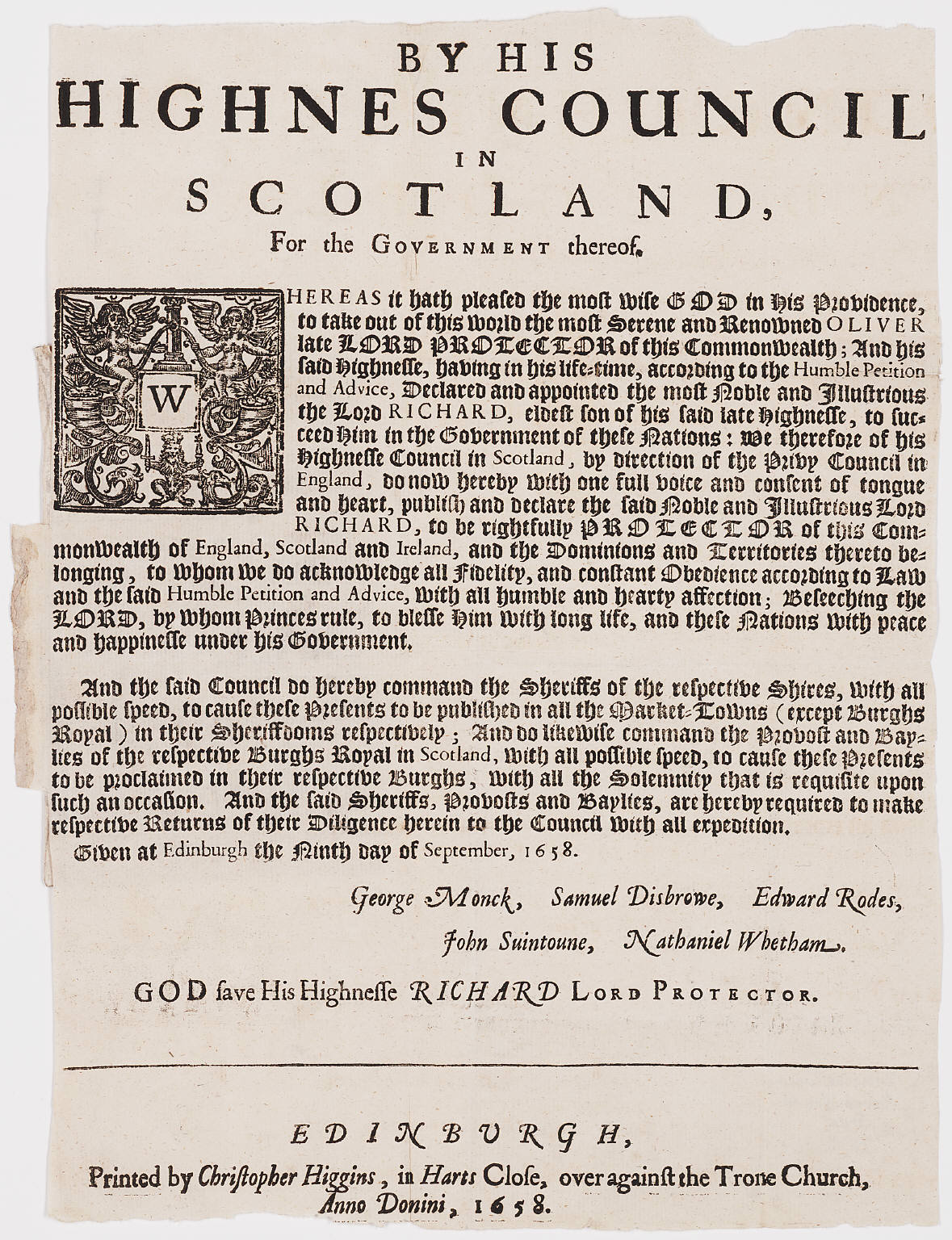|
Andrew Broughton
Andrew Broughton (1602/03–1687) was Clerk of the Court at the High Court of Justice for the trial King Charles I of England. Biography There are not many records of his early life. He was probably born in Seaton, Rutland as the younger son of Richard Broughton (d. 1635). By 1627 Broughton was living in Maidstone, Kent and in 1639 he was appointed clerk of the peace for the county of Kent by the Earl of Pembroke who was at that time Lord Chamberlain. He lost this position under the machinations surrounding the start of the English Civil War, specifically his involvement in the impeachment of Earl of Strafford and the imprisonment of Geoffrey Palmer for protesting against the Grand Remonstrance. cites: *G. J. Armytage, ed., ''The visitation of the county of Rutland in the year 1618–19'', Harleian Society, 3 (1870), 28–9 *will, TNA: PRO, PROB 11/168, fols. 39v–40r ichard Broughton*will, TNA: PRO, PROB 11/239, fols. 32r–33r ohn Broughton*J. Cave-Browne, ed., ''The marr ... [...More Info...] [...Related Items...] OR: [Wikipedia] [Google] [Baidu] |
High Court Of Justice For The Trial Of Charles I
The High Court of Justice was the court established by the Rump Parliament to try Charles I, King of England, Scotland and Ireland. Even though this was an ''ad hoc'' tribunal that was specifically created for the purpose of trying the king, its name was eventually used by the government as a designation for subsequent courts. Background The English Civil War had been raging for nearly an entire decade. After the First English Civil War, the parliamentarians accepted the premise that the King, although wrong, had been able to justify his fight, and that he would still be entitled to limited powers as King under a new constitutional settlement. By provoking the Second English Civil War even while defeated and in captivity, Charles was held responsible for unjustifiable bloodshed. The secret "Engagement" treaty with the Scots was considered particularly unpardonable; "a more prodigious treason", said Oliver Cromwell, "than any that had been perfected before; because the former qu ... [...More Info...] [...Related Items...] OR: [Wikipedia] [Google] [Baidu] |
English Interregnum
The Interregnum was the period between the execution of Charles I on 30 January 1649 and the arrival of his son Charles II in London on 29 May 1660 which marked the start of the Restoration. During the Interregnum, England was under various forms of republican government (see Commonwealth of England; this article describes other facets of the Interregnum). Politics The politics of the period were dominated by the wishes of the ''Grandees'' (Senior Officers) of the New Model Army and their civilian supporters. They encouraged (or at least tolerated) several republican regimes. From 1649 until 1653 executive powers lay with the Council of State, while legislative functions were carried out by the Rump Parliament. In 1653 the Grandees, with Oliver Cromwell in the lead, dismissed the Rump, and replaced it with a Nominated Assembly (nicknamed the Parliament of Saints or Barebone's Parliament) made up of 140 nominees, 129 from England and Wales, five from Scotland and six from Irelan ... [...More Info...] [...Related Items...] OR: [Wikipedia] [Google] [Baidu] |
1687 Deaths
Events January–March * January 3 – With the end of latest of the Savoyard–Waldensian wars in the Duchy of Savoy between the Savoyard government and Protestant Italians known as the Waldensians, Victor Amadeus III, Duke of Savoy, carries out the release of 3,847 surviving prisoners and their families, who had forcibly been converted to Catholicism, and permits the group to emigrate to Switzerland. * January 8 – Richard Talbot, 1st Earl of Tyrconnell, is appointed as the last Lord Deputy of Ireland by the English crown, and begins efforts to include more Roman Catholic Irishmen in the administration. Upon the removal of King James II in England and Scotland, the Earl of Tyrconnell loses his job and is replaced by James, who reigns briefly as King of Ireland until William III establishes his rule over the isle. * January 27 – In one of the most sensational cases in England in the 17th century, midwife Mary Hobry murders her abusive husband, Denis H ... [...More Info...] [...Related Items...] OR: [Wikipedia] [Google] [Baidu] |
1600s Births
Sixteen or 16 may refer to: *16 (number), the natural number following 15 and preceding 17 *one of the years 16 BC, AD 16, 1916, 2016 Films * '' Pathinaaru'' or ''Sixteen'', a 2010 Tamil film * ''Sixteen'' (1943 film), a 1943 Argentine film directed by Carlos Hugo Christensen * ''Sixteen'' (2013 Indian film), a 2013 Hindi film * ''Sixteen'' (2013 British film), a 2013 British film by director Rob Brown Music *The Sixteen, an English choir *16 (band), a sludge metal band * Sixteen (Polish band), a Polish band Albums * ''16'' (Robin album), a 2014 album by Robin * 16 (Madhouse album), a 1987 album by Madhouse * ''Sixteen'' (album), a 1983 album by Stacy Lattisaw *''Sixteen'' , a 2005 album by Shook Ones * ''16'', a 2020 album by Wejdene Songs * "16" (Sneaky Sound System song), 2009 * "Sixteen" (Thomas Rhett song), 2017 * "Sixteen" (Ellie Goulding song), 2019 *"16", by Craig David from ''Following My Intuition'', 2016 *"16", by Green Day from ''39/Smooth'', 1990 *"16", by ... [...More Info...] [...Related Items...] OR: [Wikipedia] [Google] [Baidu] |
Vevey
Vevey (; frp, Vevê; german: label=former German, Vivis) is a town in Switzerland in the canton of Vaud, on the north shore of Lake Geneva, near Lausanne. The German name Vivis is no longer commonly used. It was the seat of the district of the same name until 2006, and is now part of the Riviera-Pays-d'Enhaut District. It is part of the French-speaking area of Switzerland. Vevey is home to the world headquarters of the international food and beverage company Nestlé, founded here in 1867. Milk chocolate was invented in Vevey by Daniel Peter in 1875, with the aid of Henri Nestlé. The English actor and comedian Charlie Chaplin resided in Vevey from 1952 until his death in 1977. History A piloti settlement existed here as early as the 2nd millennium BC. Under Rome, it was known as Viviscus or ''Vibiscum''. It was mentioned for the first time by the ancient Greek astronomer and philosopher Ptolemy, who gave it the name Ouikos. In the Middle Ages it was a station on the Via ... [...More Info...] [...Related Items...] OR: [Wikipedia] [Google] [Baidu] |
Nicholas Love
Nicholas Love (1608–1682) was an English lawyer and one of the Regicides of King Charles I of England. Love was educated at Winchester College and Wadham College, Oxford; M.A., 1636; barrister, Lincoln's Inn, 1636. His father, also Nicholas Love (d. 10 Sept 1630) was the warden of Winchester college from 1613. He was elected M.P. for Winchester in 1645. Love was one of the judges at the trial of Charles I, but did not sign the death warrant. He retained his seat as M.P. for Winchester, in the Rump Parliament of 1659. At the restoration of the monarchy in 1660 he escaped to Switzerland. He died at Vevey in 1682. Lee, Sidney (1903), Dictionary of National Biography The ''Dictionary of National Biography'' (''DNB'') is a standard work of reference on notable figures from British history, published since 1885. The updated ''Oxford Dictionary of National Biography'' (''ODNB'') was published on 23 September ...br>Index and Epitome [...More Info...] [...Related Items...] OR: [Wikipedia] [Google] [Baidu] |
Edmund Ludlow
Edmund Ludlow (c. 1617–1692) was an English parliamentarian, best known for his involvement in the execution of Charles I, and for his ''Memoirs'', which were published posthumously in a rewritten form and which have become a major source for historians of the Wars of the Three Kingdoms. Ludlow was elected a Member of the Long Parliament and served in the Parliamentary armies during the English Civil Wars. After the establishment of the Commonwealth in 1649 he was made second-in-command of Parliament's forces in Ireland, before breaking with Oliver Cromwell over the establishment of the Protectorate. After the Restoration Ludlow went into exile in Switzerland, where he spent much of the rest of his life. Ludlow himself spelled his name Ludlowe. Early life Ludlow was born in Maiden Bradley, Wiltshire, the son of Sir Henry Ludlow of Maiden Bradley and his wife, Elizabeth, daughter of Richard Phelips of Montacute, Somerset. He matriculated at Trinity College, Oxford in Sept ... [...More Info...] [...Related Items...] OR: [Wikipedia] [Google] [Baidu] |
John Phelps (regicide)
John Phelps was a Clerk and Registrar of the Committee for Plundered Ministers and of the High Court which tried Charles I of England for high treason in 1649. Early life Not much is known about John Phelps' early life. He was born in about 1619 in Salisbury, Wiltshire, England. He matriculated at Corpus Christi College, Oxford, on 20 May 1636, describing himself as age 17, and the son of Robert Phelps of Salisbury. On 1 January 1648-9 he was appointed clerk-assistant to Henry Elsing, clerk of the House of Commons. Says Harper's Pictorial History of England, edition of 1849, pp 111–377, "The name was anciently spelled 'Phyllypes,' but has always been pronounced 'Phelps.' After the time of Edward IV, the superfluous letters were dropped. Phelps' opposition to the High Church and Charles I This family opposed the High Church, the Prerogative Party of Stafford, and Bishop Laud. They felt the British church and government under Charles I was becoming insufferably hieratic, t ... [...More Info...] [...Related Items...] OR: [Wikipedia] [Google] [Baidu] |
British History Online
''British History Online'' is a digital library of primary and secondary sources on medieval and modern history of Great Britain and Ireland. It was created and is managed as a cooperative venture by the Institute of Historical Research, University of London and the History of Parliament Trust. Access to the majority of the content is free, but other content is available only to paying subscribers. The content includes secondary sources such as the publications of The History of Parliament, the Royal Commission on the Historical Monuments of England, the Calendar of Close Rolls, ''Survey of London'' and the ''Victoria County History''; and major published primary sources such as ''Letters and Papers of the Reign of Henry VIII'' and the ''Journals'' of the House of Lords and House of Commons. The places covered by ''British History Online'' are: British History Online began with a one-year pilot project in 2002 (Version 1.0), and Version 5.0 was launched in December 2014. Versi ... [...More Info...] [...Related Items...] OR: [Wikipedia] [Google] [Baidu] |
Indemnity And Oblivion Act
The Indemnity and Oblivion Act 1660 was an Act of the Parliament of England (12 Cha. II c. 11), the long title of which is "An Act of Free and General Pardon, Indemnity, and Oblivion". This act was a general pardon for everyone who had committed crimes during the English Civil War and subsequent Commonwealth period, with the exception of certain crimes such as murder (without a licence granted by King or Parliament), piracy, buggery, rape and witchcraft, and people named in the act such as those involved in the regicide of Charles I. It also said that no action was to be taken against those involved at any later time, and that the Interregnum was to be legally forgotten. An act of free and general pardon, indemnity and oblivion History The Indemnity and Oblivion Act fulfilled the suggestion given in the Declaration of Breda that reprisals against the establishment which had developed during the English Interregnum would be restricted to those who had officiated in the regicid ... [...More Info...] [...Related Items...] OR: [Wikipedia] [Google] [Baidu] |
English Restoration
The Restoration of the Stuart monarchy in the kingdoms of England, Scotland and Ireland took place in 1660 when King Charles II returned from exile in continental Europe. The preceding period of the Protectorate and the civil wars came to be known as the Interregnum (1649–1660). The term ''Restoration'' is also used to describe the period of several years after, in which a new political settlement was established. It is very often used to cover the whole reign of King Charles II (1660–1685) and often the brief reign of his younger brother King James II (1685–1688). In certain contexts it may be used to cover the whole period of the later Stuart monarchs as far as the death of Queen Anne and the accession of the Hanoverian King George I in 1714. For example, Restoration comedy typically encompasses works written as late as 1710. The Protectorate After Richard Cromwell, Lord Protector from 1658 to 1659, ceded power to the Rump Parliament, Charles Fleetwood and J ... [...More Info...] [...Related Items...] OR: [Wikipedia] [Google] [Baidu] |
Richard Cromwell
Richard Cromwell (4 October 162612 July 1712) was an English statesman who was the second and last Lord Protector of the Commonwealth of England, Scotland and Ireland and son of the first Lord Protector, Oliver Cromwell. On his father's death in 1658 Richard became Lord Protector, but lacked authority. He tried to mediate between the army and civil society and allowed a Parliament containing many disaffected Presbyterians and Cavalier, Royalists to sit. Suspicions that civilian councillors were intent on supplanting the army were brought to a head by an attempt to prosecute a major-general for actions against a Royalist. The army made a threatening show of force against Richard and may have had him in detention. He formally renounced power nine months after succeeding. Although a Royalist revolt was crushed by the recalled civil war figure General John Lambert (general), John Lambert, who then prevented the Rump Parliament from reconvening and created a Committee of Safety, Lam ... [...More Info...] [...Related Items...] OR: [Wikipedia] [Google] [Baidu] |





